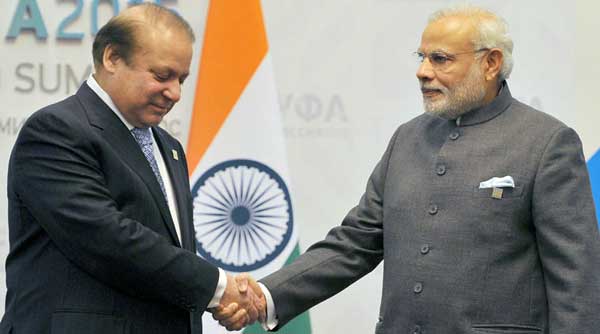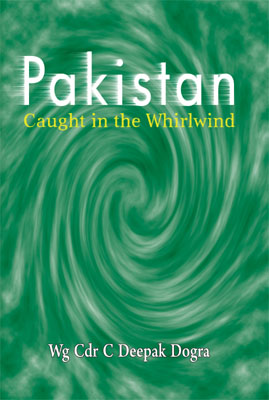The world is concerned as relations between two nuclear powers, i.e., India and Pakistan, are deteriorating. Pakistan, which has launched a low-intensity war against India, constantly infiltrates terrorists into India and threatens to use nuclear warheads if a war occurs. Pakistan, which was created on the basis of a two nation theory, still harbours enmity and suspicion against India. The civilian government of Pakistan may like to have friendly relations with India, but the all-powerful Pakistani army, which survives on the hypothesis of danger from India, does not allow the civilian government to have cordial relations.
There are several outstanding issues between both countries, and it is very difficult to sort them out in one go. Nonetheless, both countries should make sincere efforts first to resolve less important issues and then slowly to try to sort out major issues, including the Kashmir problem. All issues can be sorted out bilaterally without interference of any other country, including the United Nations. There is a need to start negotiations and enhance direct trade between India and Pakistan. Pakistan should also understand that India is powerful and no other country will come to help in case of war and the next war may be catastrophic for its existence.
Ajit Doval, the present NSA, collected convincing evidence about creepy ISI involvement in the flaring-up terrorism in India. The recent arrest of two Pakistani terrorists has made India’s case strong.
Deep-Rooted Suspicion and Anti-India Activities
The inhabitants of both countries view each other with great suspicion and distrust. According to a poll conducted by a news agency in 2013, only 11 per cent of Indians and 19 per cent of Pakistanis view each other’s influence as positive.
Pakistan, which has emerged as a focal point of terrorism, alleges that India funds the Muttahida Quami Movement (MQM), which is dominant in Karachi, Sukkur and Hyderabad and creates violence in these cities, especially in Karachi, at the behest of India.
Pakistan, which trains terrorists and sends them regularly to India to carry out terrorist activities, charges that India is also supporting separatist elements in Baluchistan.
Indian security forces caught three Pakistani nationals of Lashkare- Taiba alive in three different terrorist incidents: Ajmal Kasab, Mohammed Naveed Yakub and Sajjad Ahmad. All these terrorists mentioned during interrogation that they were trained in the camps run by the nefarious ISI or terrorist outfits controlled by the ISI.
The cancellation of national security advisers’ (NSAs’) meeting in August 2015 by the Nawaz government under undue pressure from the Pakistani army is unfortunate. Nawaz and Modi at Ufa, Russia, decided that the NSAs would discuss terrorism. Hence the insistence later that the NSA talks must include Kashmir, Siachen, Sir Creek, etc., clearly indicated that Pakistan wanted to sabotage the talks.
The Pakistani army, including the despicable ISI and the various terrorist outfits sponsored by them, do not want cordial relations with India … They understand that their significance lies in anti-India rhetoric.
Pakistani high commissioner Abdul Basit and NSA Sartaj Aziz were adamant that they would meet leaders of All Parties Hurriyat Conference during Aziz’s visit to India, which was mischievous. It is a different issue that the Hurriyat leaders have no following and they have lost their credibility even in the valley.
The decision of the Modi government that neither would they meet the Kashmiri separatists nor will they allow the Pakistanis to meet them is the right decision, and the government of India must adhere to it.
Ajit Doval, the present NSA, is an old Intelligence Bureau hand who was also posted in Islamabad. He collected convincing evidence about creepy ISI involvement in the flaring-up terrorism in India. The recent arrest of two Pakistani terrorists has made India’s case strong.
India has also made a dossier about Dawood Ibrahim in which India gave his latest photograph, details of his more than one passport and particulars of his properties in Pakistan, including Karachi, which has made India’s case stronger.
The government of United Arab Emirates started seizure of the properties of Dawood Ibrahim as a fallout of the recent visit of the Indian prime minister.
The Pakistani army, including the despicable ISI and the various terrorist outfits sponsored by them, also do not want cordial relations with India because firstly they want to capture Jammu & Kashmir (J&K) and secondly the Pakistani defence establishment and the terrorist outfits supported by them would lose importance. They understand that their significance lies in anti-India rhetoric. There is also an important segment of Pakistani society as well as of the defence establishment that falsely proclaims that hardliners in India do not accept the partition and want to disintegrate Pakistan and then merge it into India. They cite the examples of the creation of Bangladesh as well as the amalgamation of Sikkim into India.
Unfortunately, fundamentalism has grown so much in Pakistan that several Pakistani defence personnel genuinely believe that through jihad, they can impose the domination of Islam in South Asia.
Low-Intensity War Waged by Pakistan
Pakistan has waged a low-intensity war against India. The security agencies of India have collected undeniable data pertaining to the involvement of the ISI in infiltrating terrorists into India. Besides this, Pakistani nationals caught while carrying out terrorist activities have given full details about the training and funding, the supply of arms and ammunition, the assistance in border crossing, and the names and ranks of the ISI officers imparting the training.
In 2009, the then Pakistani president Asif Zardari also accepted that Pakistan assisted terrorist outfits to fulfil its geostrategic aspirations. The infallible details given by India were also accepted by several countries, including the United States and the United Kingdom.
Terrorists of several countries, including Pakistan, have taken refuge in Federally Administered Tribal Areas (FATA). The ISI, as well as terrorist outfits sponsored by the ISI, is running training camps in the area. In these training camps, serving and retired army officers impart training. These trained terrorists carry out terrorist activities in several countries, including India, Afghanistan, Russia, China and Israel and even in Western countries.
Unfortunately, fundamentalism has grown so much in Pakistan that several Pakistani defence personnel genuinely believe that through jihad, they can impose the domination of Islam in South Asia.
The ISI assists several terrorist groups, including al-Qaeda, Jaishe- Mohammad, Lashkar-e-Omar, Lashkar-e-Taiba, Jamaat-ud-Dawa, Sipahe- Sahaba and the Haqqani Network. Besides this, the ISI has also created the Indian Mujahideen (IM), which is a group of misguided Indian Muslims who carry out terrorist activities in India at the behest of the ISI. These young Indians are sent to Pakistan through Middle Eastern countries for training jn terrorism. In the training, maulvis (preachers) regularly preach to them about jihad and Islam in such a way that the trainees become fanatics.
Hate speeches by Pakistani and some Indian leaders and selfish interests of various pressure groups make it abundantly clear that the probability of long-term peace between the two neighbours is very remote.
The Pakistani spy agency has also created Brigade 313 to carry out terrorist activities across India, especially in J&K. The ISI selected this name to give a religious fervour to Islamic extremists as 313 soldiers under Prophet Mohammed defeated a much larger army. The dreadful Brigade 313 has terrorists from various terrorist outfits, including Lashkare- Taiba and Jaish-e-Mohammad. However, now, a faction of Brigade 313 opposed to the policies of the ISI has started carrying out terrorist acts within Pakistan also.
There is conclusive evidence that the ISI has helped Naga insurgents, Naxalite outfits, the United Liberation Front of Asom (ULFA), insurgent groups of the Khalistani movement, etc.
Pakistan, instead of curbing assistance to various terrorist outfits, alleges that India is helping secessionist movements in Pakistan, including Baluchistan.
The Way Ahead
The leaders of both countries have met several times, goodwill visits were exchanged, umpteen numbers of meetings between the foreign ministers/foreign secretaries were held and several confidence-building measures were introduced, but the differences and mistrust between India and Pakistan could not be mitigated. Hate speeches by Pakistani and some Indian leaders and selfish interests of various pressure groups make it abundantly clear that the probability of long-term peace between the two neighbours is very remote. Both parties understand that Pakistan was created after a gory partition and since then, enmity between both countries has never lessened.
The meeting between the NSAs of both countries was cancelled at the behest of Pakistan. Hence India could not give the dossiers to the Pakistani NSA. Now Indian diplomatic missions abroad should launch a campaign with all the facts and figures to prove that Pakistan is sponsoring terrorism in the region, especially in India and Afghanistan. India should also try to take the help of Afghanistan in this regard to convince the world that Pakistan should be declared a terrorist state and strict sanctions need to be imposed.
India, which has emerged as the largest importer of arms and ammunition, should also try to take the help of countries exporting defence armaments to India, especially the United States, France, etc., in its diplomatic offensive against Pakistan and should try to impose severe sanctions against it.
India should also convey to Pakistan a strong message that although India is a peaceful country and does not want to interfere in the internal affairs of any other country, Pakistan must remember that it has several internal problems, like secessionist movements in Baluchistan, Sindh and Khyber Pakhtunkhwa. Besides these muhajirs, Sairakis, residents of POK, Gilgit-Baltistan and several other nationalities want more autonomy. Hence Pakistan should stop assisting terrorist outfits in India as this can be dangerous for its survival.
There is lot of radicalisation in the Pakistani army as well as bureaucracy. Efforts should be made to de-radicalise them. Otherwise, the society cannot get rid of fundamentalism and extremism.
The acrimony between India and Pakistan can be dangerous for the whole world. So world leaders should make an effort to take Pakistan off from the path of extremism. The madrassa culture has made Pakistani society narrow minded and a producer of terrorists, which is dangerous to the entire world. Hence Western countries should make an effort to reduce the number of madrassas and Muslim countries should stop financing these terror factories. The Pakistani government, on its part, should introduce modern education in these madrassas, which will reduce extremism among students and help them get jobs after they pass out from these madrassas.
There is lot of radicalisation in the Pakistani army as well as bureaucracy. Efforts should be made to de-radicalise them. Otherwise, the society cannot get rid of fundamentalism and extremism.
The Pakistan government must compel the ISI to dismantle the terrorist infrastructure, including the training camps run directly by them or managed by various terrorist outfits financed by the ISI. Pakistan trains terrorists in POK, FATA, Khyber Pakhtunkhwa, Baluchistan and other places.
The countries which render financial assistance to Pakistan must ensure that Pakistan uses the funds in the economic development of the country. The assistance should not be misused in purchase of weaponry or in enhancement of terrorism.
There are several terrorist outfits which operate between Pakistan and Afghanistan, and the terrorists take refuge in one country after carrying out terrorist activities in the other country. The time has come when both countries should launch a joint operation to eliminate these terrorist outfits.
India should continue talking to Pakistan and try to resolve all issues amicably but must remain prepared to face another invasion from Pakistan.
Pakistan has already attacked India four times, including Kargil in 1999, and the present Pakistani army chief, Raheel Sharif, stated at the National Defence University, sometimes back that Kashmir is an unfinished agenda of the partition of 1947 and that Pakistan and Kashmir are inseparable. Hence the possibility that Pakistan may attack India again cannot be ruled out. Therefore, India should continue talking to Pakistan and try to resolve all issues amicably but must remain prepared to face another invasion from Pakistan.
India must reinforce its intelligence agencies, which should be equipped with latest electronic gadgets, including unmanned aerial vehicles. More trans-border operations should be launched so that Indian security forces are aware about the movement of the Pakistani army.
The current Indian army chief, Dalbir Singh Suhag, stated in a seminar organised on the occasion of the Golden Jubilee of the 1965 Indo-Pak war that India must be ready for a short war. The warning from the army chief is relevant, and India must remain ready for the same.
Both countries should try to inculcate friendly relations and should start negotiations again. The next South Asian Association of Regional Cooperation (SAARC) summit would be held in Pakistan in July 2016. Pakistan would invite Modi to attend the summit. Therefore, both countries should try to start negotiations before the SAARC summit. The meeting at Ufa between the prime ministers of India and Pakistan and fixing of a meeting between the NSAs of both countries were good gestures, but the cancellation of the meeting by Pakistan on flimsy grounds was unfortunate.
The Pakistani army, especially the ISI and terrorist organisations, has vested interests and does not allow cordial relations with India.
Nawaz Sharif and Modi were staying in the same hotel in New York and attended the 70th session of the UNGA, but no meeting was held between them regrettably. Similarly unfortunate were the speech by the Pakistani prime minster in the UNGA and the hard-hitting rebuttal by Sushma Swaraj.
Both democratically elected prime ministers legitimately want the rapid development of their countries as they can win the next elections only if they implement the development agenda on which they won the elections. The voters of both countries want improvement and better lives, which is feasible only if India and Pakistan live peacefully and invest their scarce resources in poverty-alleviation programmes instead of spending money on the purchase of arms and ammunition.
In Pakistan, most of the time, the army has ruled the country, and even when a civilian government was in power, the army remained supreme. So the democratic institutions could not become strong in the country. The Pakistani army, especially the ISI and terrorist organisations, has vested interests and does not allow cordial relations with India.
Pakistan should stop distinguishing between good and bad terrorists and must understand that terrorists have no religion. Terrorists have done more damage to Pakistan than any other country, including India. Extremists, after subjugating minorities, are now attacking Shias, and after Shias are subjugated, different schools of Sunnis will fight among themselves. Hence the Pakistan government must eradicate extremism of all kinds.
Pakistan should stop abetting terrorist outfits. When a Pakistani terrorist is caught or killed in India, the relations between both countries become tense. Hence Pakistani security agencies must exterminate the terrorist training camps in the country.
India is more powerful than Pakistan. Hence Pakistan must stop the low-intensity war against India and should try to inculcate friendly relations.
Pakistan should adopt a pragmatic approach. So far, it has fought four wars with India and it has had the best of relations with several countries, including the US, China and Middle Eastern countries, but at the time of war, no country has sent its forces to assist the losing Pakistani forces. Every country has to fight its own war, and India is more powerful than Pakistan. Hence Pakistan must stop the low-intensity war against India and should try to inculcate friendly relations.
Pakistani generals should immediately stop bragging about nuclear warheads. The present government would retaliate with full force, and Pakistan, which has much lesser depth, will vanish while some population in India will survive. Pakistan should also understand that the nuclear plant at Kahuta is very near the Indian border and can be an easy target.
The leadership of both countries must understand that war is no solution to any problem. They must stop war mongering and should start creating an atmosphere in which talks can start. First of all, the finance ministers with delegations of businessmen should exchange visits. Pakistan should give the MFN status to India so that trade between both countries augments. In fact, direct trade between India and Pakistan is less in comparison to trade through third countries, and in this way, the cost of transportation and intermediary profit is unnecessarily added. The trade balance is too much in favour of India. Hence Indian authorities should liberalise more items so that Pakistani export to India improves. Once trade increases, the chances of good relations also increase.
India as well as the saner elements in Pakistan should try to start negotiations on non-controversial issues, and then slowly and steadily low-profile issues can be taken up. Both countries are suspicious of, mistrust and hate each other – a situation that has been there for the last 70 years. Besides, there are several pressure groups which have vested interests in a continuation of enmity between India and Pakistan. So the process of peace and tranquillity will be slow, but the process must start.
The Pakistani defence establishment should negotiate with India on issues like water sharing, energy cooperation and climate change, and even small achievements in these fields should be publicised. The positive points should be highlighted, while negative publicity must be curbed.
The Pakistani defence establishment must understand that the present government wants peace with all neighbours, including Pakistan, but in case of border violations, terrorist attacks or any type of aggression, it would retaliate with full force. However, Pakistan defence forces do not want to understand this simple logic and are continuing with their anti-India designs.
The statement of the Indian air force chief Air Chief Marshal Arup Raha on 3 October 2015 that the IAF is capable of attacking terrorist camps on the other side of the border may be a timely warning to Pakistan, but the policymakers must analyse its feasibility as it may trigger a war between two nuclear powers which may be disastrous for both countries.








hahahhah